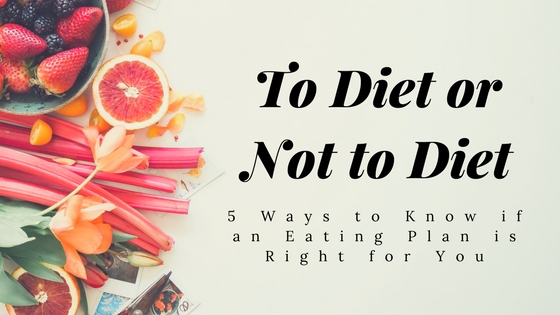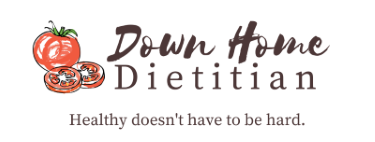To Diet or Not to Diet: 5 Ways to Know if an Eating Plan is Right for You

Floating around social media the last few days I’ve seen several articles on either side of the “diet” coin:
“Why you shouldn’t diet in 2018”
“Top 6 Diets of 2018”
“Don’t diet this January”
You may have a goal to be healthier and take care of yourself this year – many people do, and that’s great! So, should you “diet”?
A lot of nutrition and fitness coaches will tell you that diets never work and that you need only listen to your body, feed it when it wants food, and don’t when it doesn’t (often called intuitive eating). That works really well for people who are in tune with their bodies, have normally established hunger cues, and like to eat healthful foods. Unfortunately, that’s not the case for many of the clients I work with. These habits and hunger cues can be learned, but it takes time and it’s a frustrating road for a lot of people. Everyone is different, which is why I’ve learned to avoid all or nothing statements like “diets never work.”
At some point, this kind of comes down to semantics.
You can call it a diet, you can call it a lifestyle change, you can call it an eating plan, but ultimately what matters is whether or not it works with and for YOU.
I’ve seen people try strict diet plans that don’t fit their lifestyles, fight tooth and nail to stick to them, and feel totally defeated when they can’t seem to make it work. I’ve also seen people try to eat intuitively without any boundaries or guidelines and flounder, frustrated that they don’t seem to be making any progress.
On the other hand, when people find the right balance of structure and freedom to fit their lifestyles – it’s magic. They have a plan that is tailored to work with their unique personalities, budgets, families, and favorite foods. They are achieving their goals and they’re happy and feel great doing it. This is the elusive magical unicorn of healthful eating.
It can be a daunting task to find your own magical unicorn, so I’ve compiled some tips to help you out. Without further ado, here are 5 ways to know if an eating plan is right for you:
1. It’s not miserable/exhausting.
It makes me sad that I even have to say this, but it happens all the time. People put themselves through psychological and physical torture because they think it’s the only way to achieve their health goals – not so! The right plan will not make you sad and miserable, or be so labor intensive that you can barely keep up. If you love all kinds of food, for example, paleo wouldn’t be a good choice – you’ll be miserable saying no to so many things you love. If you have eaten breakfast your entire life and are hungry every few hours, intermittent fasting probably isn’t for you (you can read about my experience with that here). If you hate numbers and don’t like tedious tracking, don’t count calories! You’ll hate it!
Choose or design a plan that works with your individual preferences and quirks.
2. You’re not hungry all the time.
We’re trying to make your body healthy and happy. Constant underlying hunger is not conducive to either of those goals. ‘Nuff said.
3. It doesn’t restrict your social life.
Your eating plan should work beautifully into your social life. You should never skip out on girls’ or guys’ night because you are “on a diet.” You may end up ordering differently than you have in the past (or not!) but your social life is a huge part of a healthy life too. Don’t let an overly restrictive eating plan intended to make you healthier screw up other aspects of your health. You can read about my experiences with a social life-crushing diet here. It’s not worth it, trust me.
4. It includes all the foods you enjoy except legitimate allergies or intolerances, at least some of the time.
There is absolutely no reason to cut out entire categories of foods to lose weight. Certain medical conditions excepted, you should never have a list of foods you’re “not allowed” to eat. First of all, psychologically, you’re setting yourself up for the trap of only wanting what you “can’t” have. Second, why be more restrictive than is necessary? The ideal plan is the least restrictive plan that still heads you toward your goals. You may eat certain things less often and in smaller portions, but avoid plans that label foods as “good/allowed” and “bad/not allowed.”
5. You’re making progress.
Obviously, your plan needs to be making you healthier or what’s the point? Now I need to stress something very, very important here. Very important. Huge. Please don’t skip over this:
Progress comes in many forms, and most of them are not on the scale.
Please, please, please don’t gauge your success or failure only on your weight. A healthful eating plan should improve your health in so many other ways: Are you eating more vegetables? Do you have more energy? Do you sleep better? Is your skin clearer? Do you find yourself snacking less after dinner? Do your clothes fit better? Is your mindset more positive? Do you have less pain?
All of these are potential benefits of improved eating habits, and they’re nothing to sniff at! Be aware of them, because weight can be a fickle mistress, but health is so, so much more than weight.
So before you start a new eating plan this year, make sure it fits these criteria. As always, if you feel overwhelmed or lost at the idea of trying to find an eating plan that works for you, find a dietitian who can help you find a plan that fits your life. If you’re in Washington state, I’d be honored to work with you! Click here if you’re interested.
Have a happy, healthy new year!




Leave a Comment